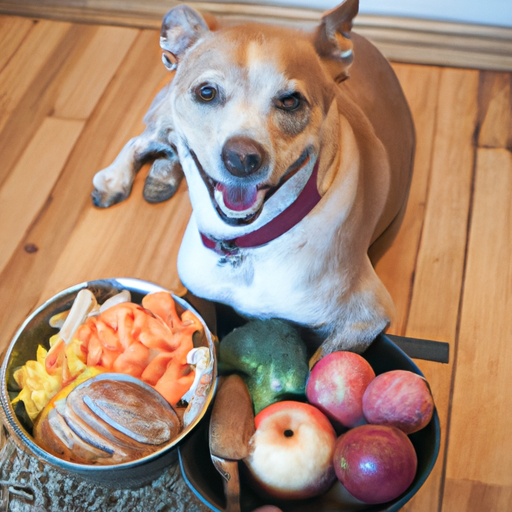Understanding Your Dog’s Dietary Needs
As a caregiver, you’ve likely found yourself wondering, “What can my dog safely eat?” It’s a valid question, considering that our canine companions have dietary needs different from ours. While it’s easy to assume that dogs can eat what humans eat, it’s crucial to remember that their digestive systems are not as versatile.
Dogs, like humans, require a balanced diet to maintain good health. They need proteins, carbohydrates, and fats, as well as a variety of vitamins and minerals. However, some foods that are safe and healthy for humans can be harmful to dogs.
Safe Foods for Your Dog
Here’s a list of human foods that are safe for your dogs:
- Carrots: These are low in calories and high in fiber and vitamins.
- White Rice: Cooked white rice can be good for a dog’s stomach, especially if they’re having tummy troubles.
- Fish: Salmon and tuna are rich in good fats and amino acids that support your dog’s health.
- Turkey: Cooked turkey is a great source of lean protein for dogs.
- Peanut Butter: It’s a favorite treat of many dogs. Not only is it a good source of protein, but it also contains heart-healthy fats, vitamin B, niacin, and vitamin E.
It’s important to remember to serve these foods in moderation and ensure they are properly prepared.
Foods to Avoid
Just as there are foods that are safe for dogs, there are also those that should be avoided. Here are some foods that can be harmful to your dog:
- Chocolate: It contains theobromine, which can be toxic to dogs.
- Onions and Garlic: These can damage a dog’s red blood cells, leading to anemia.
- Grapes and Raisins: These can cause kidney failure in dogs.
- Avocado: It contains persin, a substance that can be toxic to dogs.
Special Dietary Considerations
Every dog is unique, and their dietary needs can differ based on their age, size, breed, and health status. For instance, puppies require a higher protein diet for growth and development, while senior dogs may need fewer calories but more fiber and certain nutrients.
| Life Stage | Dietary Consideration |
|---|---|
| Puppy | High Protein |
| Adult | Balanced Diet |
| Senior | Low Calorie, High Fiber |
Frequently Asked Questions
Q: Can dogs eat dairy products?
A: Some dogs can tolerate dairy, while others may experience digestive upset. It’s best to observe your dog’s reaction to small amounts of dairy before making it a regular part of their diet.
Q: Are eggs safe for dogs?
A: Yes, eggs are safe for dogs to eat. They’re a great source of protein and can be beneficial for an upset stomach.
Q: Can dogs eat raw meat?
A: Feeding raw meat to dogs can be risky due to the potential for bacterial contamination. It’s advisable to cook the meat to kill off any harmful bacteria.
Remember, when in doubt about a food’s safety, consult your vet. It’s better to be safe than sorry when it comes to your furry friend’s health.



